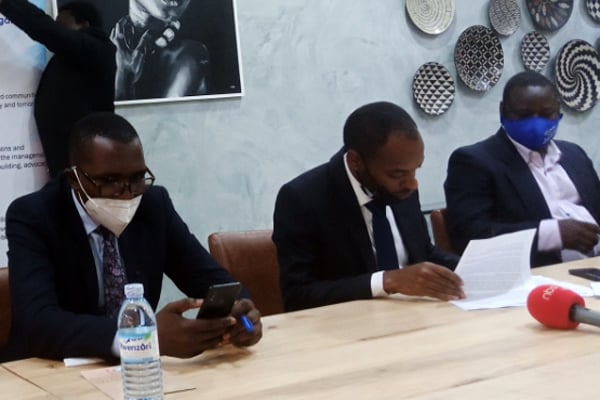Activists ask govt to disclose details of oil related agreements

The executive director Open Health Network Moses Mushime (left), the chairman Publish What You Pay Mr Gideon Nshambire Atukwatse (Center)pictured during a press conference at Fairway Hotel. PHOTO/ BEATRICE NAKIBUUKA
What you need to know:
- In April 2021, Uganda signed agreements with the EACOP stakeholders like the National Pipeline Company (U) limited, Tanzania Petroleum Development Corporation, Total Holdings International and China National Offshore Oil Company.
A section of civil society activists have asked the government to urgently disclose the major key agreements that Uganda signed with the East Africa Crude Oil Pipeline (EACOP) company stakeholders.
The activists under their umbrella body, Publish What You Pay, a 45-membership civil society organizations umbrella body working to promote sustainable extractive industries in Uganda, during a media briefing in Kampala said the government of Uganda should systematically disclose and explain to the public and mining communities the revenues, volumes and other critical information on mining and production.
Mr Gideon Nshambire Atukwatse, the chairperson said, “the EACOP Bill in one way or the other seeks to ratify agreements that have confidentiality and secrecy clauses. This makes it difficult for these agreements to be scrutinized by the public and later on ascertain the financial implications to be borne by the government arising out of these agreements.”
In April 2021, Uganda signed agreements with the EACOP stakeholders like the National Pipeline Company (U) limited, Tanzania Petroleum Development Corporation, Total Holdings International and China National Offshore Oil Company.
Other agreements such as Host Government Agreement, Transportation and Tariff Agreement, Shareholder’s Agreement, Inter-Government Agreement and Production Sharing Agreement were all signed to facilitate the smooth implementation and operationalization of the EACOP project but all remain a secret.
Mr Atukwatse said, “Several attempts by Ugandans to access the information regarding oil production-sharing agreements with multi-national companies have been rendered futile due to their non-disclosure clauses.”
With particular focus on promoting transparency and accountability in the sector, the activists argued that there is an increasing recognition of transparency in public data which is essential for the citizens to gain access and understanding of contracts agreed by their governments to ensure that they obtain the fullest benefit from the exploitation of the natural resources. A failure for the government to publicise these agreements block transparency and accountability of the revenue that comes with these clauses.
Mr Atukwatse also urged the parliament to delay the finalization of the EACOP Special Provisions Bill 2021 and the Public Finance Amendment Act Bill 2021 until adequate public consultation is done.
He said, “These must be subject to public scrutiny before proceeding to pass them into laws. If this is not done, it puts Uganda into a big dilemma as parliament will fall into a trap and the temptation of ratifying what is fundamentally illegal and offends the rules of equity, fairness and natural justice.”
"Uganda has had incidents where we have fallen victims of secrecy. Look at what happened to our airport; the bad deals that the government has gotten into on behalf of the citizens when the citizens are not aware. We have ended up with clauses that do not favor us and instead end up wasting more money," he said.
Mr Moses Mushime, the executive director Open Health Network also urged the parliament to reject the Public Finance Management Bill which gives the Uganda National Oil Company (UNOC) which will be doing business on behalf of the country all the power to collect all the revenue from the oil production and spend even outside the budget without parliamentary appropriation and oversight.
Mr Mushime said, "At the point when we are about to start production, why is the government wielding all the power from the executive and the citizens. UNOC should be accountable to the parliament. We fear that the country will not benefit from the agreements."
He further remarked that the EACOP Bill is meant to deny the government the opportunity to maximize petroleum revenues which are needed to support the programs of the government.
"In the bill, there is a different tax regime that supersedes the current tax regime and is not answerable to the parliament. Government will lose over Shs40 trillion in the next 40 years with the tax regime that is prone to corruption and will escalate the already existing tax collection problem."




